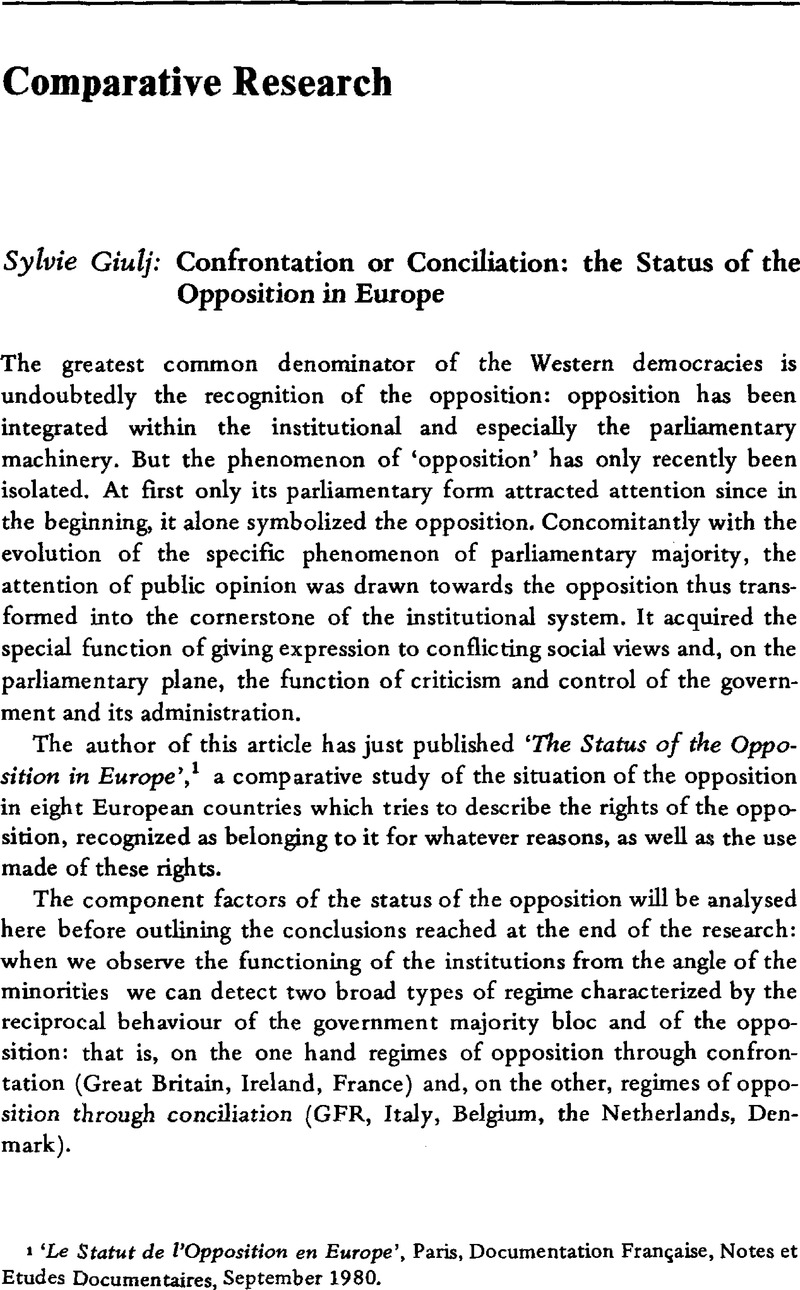Article contents
Confrontation or Conciliation: the Status of the Opposition in Europe
Published online by Cambridge University Press: 28 March 2014
Abstract

- Type
- Comparative Research
- Information
- Copyright
- Copyright © Government and Opposition Ltd 1981
References
1 ‘Le Statut de I’Opposition en Europe’, Paris, Documentation Française, Notes et Etudes Documentaires, September 1980.
2 This does not seem to be necessary in the classic parliamentary regimes in which majorities are made and unmade. On the other hand, the problem is different when a stable and disciplined majority appears in parliament.
3 One could however propose a general definition as ‘the parliamentary opposition is made up of some of the members who have stated officially that they do not support the government’.
4 Erskine May, Treaty on the law, privileges, proceedings and usage of Parliament, 16th ed., 1971, p. 259.
5 We are not concerned here with the rights granted to every member of parliament regardless of political allegiance and which also benefit the opposition, insofar as they are an integral part of its status: Question time, motions of adjournment, questions under SO No. 9 particularly.
6 Article 11 of the charters issued for the second network, TF1 and Fr3 (Journal Officiel, supplementary number of 7 May 1950).
7 In fact the time is shared equally between ‘the groups’ because of the changes which have taken place within both the majority and the opposition.
8 It must be remembered that this law increased the ‘politicization’ of the channels since in practice it places the first channel under the control of the Christian Democrats and the second under that of the Socialists.
9 This does not mean that the government, on its own initiative, does not implement part of the opposition’s programme in order to win over the latter's voters in the next elections. But the government takes the credit for the proposals and does not look for compromise. For its part, the opposition will vote against the proposal, even though it includes many of its own recommendations.
10 Sweden provides another example of this: for forty years there had been no alternation in power in that country.
11 Notably, no commission of enquiry has been set up at the request of only a quarter of the members of the Bundestag, as is authorized by article 44 of the Fundamental Law.
12 This is independent of cases of alternation in power following on a change of regime. This is why the period under consideration is shortest for France (counting from 1958).
13 Another example for France is the participation of the Radical Party in almost all the governments of the Third Republic from the beginning of the century until 1940.
14 ‘We are not formally in opposition, but nor are we formally part of the majority. The concrete problems are another matter’. Enrico Berlinguer, debate on the investiture of the Andreotti government. See Le Monde, 12 August 1976.
15 This speech appears in the Bundestag stenographische Berichte, 1, 1949 (32).
16 For the description of the different phases of the behaviour of the German opposition see Manfred Friedrich, Opposition im deutschen Bundestag: Phasen Opposition eilen verhalten 1949 bis 1972, in Zeitschrift für Parliamentsfragen 1973 (3), pp. 392–406. This author distinguishes several phases: 1949–53: competitive opposition of the SPD; 1960–66: change to a policy of opposition implying co‐operation; 1960–66: co‐operative opposition; 1966–69: opposition of a single party FDP; 1969–72: competitive opposition of the CDU‐CSU.
17 Cf. Le Monde, 21 November 1972.
18 Uwe Thayssen, Parlamentärisches Regierungsystem in der Bundesrepublik Deutschland, Opladen, Leske Verlag Budrich Gmb, 1976.
19 On the dangers of an overdeveloped conciliation in relation to the needs of the system see Brian Barry, ‘The Consociational Model and its Dangers’, in European Journal of Political Research, No. 4, December 1975, pp. 393–411.
- 6
- Cited by


